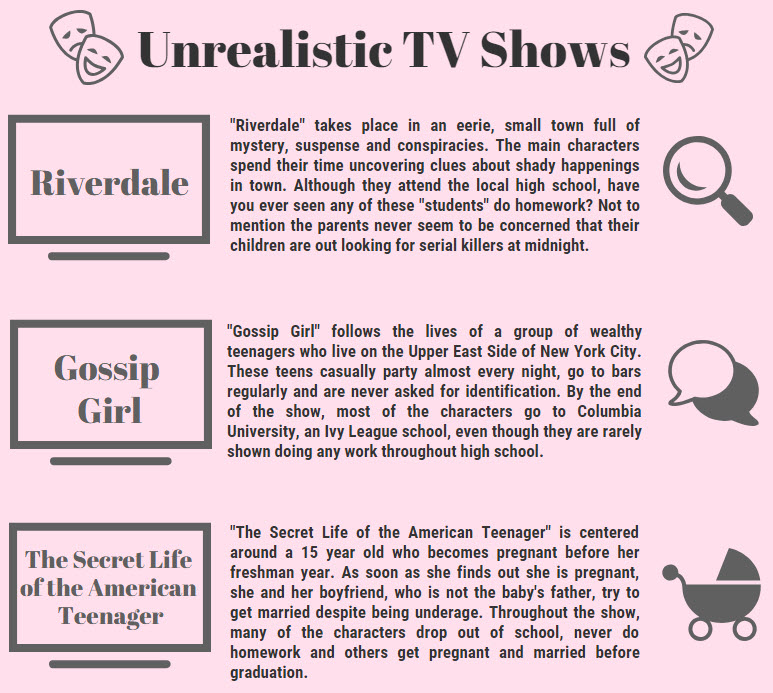High school on the silver screen
False media portrayals of teenage life increase student stress
March 28, 2019
At some point, every student has heard the phrase, “High school is the best four years of your life.” In addition to this testimony, TV shows and movies often feature romanticized versions of high school life. Anyone who grew up watching “High School Musical” will most likely remember thinking that their high school experience would be full of dramatic dance breaks, posh mean girls and spontaneous singing. Did anyone ever stop to think about when these “students” actually did their homework? How about when they took tests and prepared for college? Despite having no evidence that they worked hard throughout high school, they all seem to get into Ivy League universities. Unrealistic portrayals such as these can be misleading to groups of younger children and can be disappointing to those who have actually experienced high school life, especially because we often feel obligated to model what is presented to us in the media.
“It’s frustrating to see that, as a teacher, I can see my students trying to live up to what the entertainment industry and social media set as the ‘standard,’ and if everyone stopped trying to obtain it or see it as perfection, the standard would change,” drama teacher Shannon Khatcheressian said. “Being a teenager is hard enough, and when you add external influences that no one can readily obtain, it’s an added stressor.”
The depiction of high school life in entertainment not only affects high school students, but also younger children.
“I remember going into high school having so many different expectations from what I saw from social media,” junior Munise Karaburk said. “I feel like having more realistic aspects of high school, such as the heavy workload and the stress of colleges, would prepare younger kids better for what to expect.”
Unfortunately, portraying accurate scenarios in the entertainment world isn’t always realistic for those who make money off of these representations. Production companies are focused purely on what sells and how to make a profit. TV shows and movies are made largely for entertainment purposes and often provide an escape for all of us who have to face the challenges of everyday life. Depicting characters facing real problems may make the average viewer less inclined to watch.
“If I were a movie director or writer, I wouldn’t make movies more realistic,” junior Tiffany Fung said. “That’s so boring; no one would care,”
However, there are various ways of presenting relatable situations in the media. Presenting engaging, realistic scenarios in a comedic format could still attract viewers.
“If there was more opportunity for us to see that other people are struggling and experiencing similar journeys, high school students could find a way to relate and not feel as though they are the only one,” Khatcheressian said. “You can do this through writing comedy.”
No matter what, teens should keep in mind that the attitudes and drama of the entertainment we view can seep into our real lives, but only if we let it.
“It is imperative that we share more entertainment that doesn’t glorify choices that aren’t going to make us better people in the long run,” Khatcheressian said. “There is enough pressure to be a teenager with your day-to-day choices; that journey is something that all of you are going through.”


